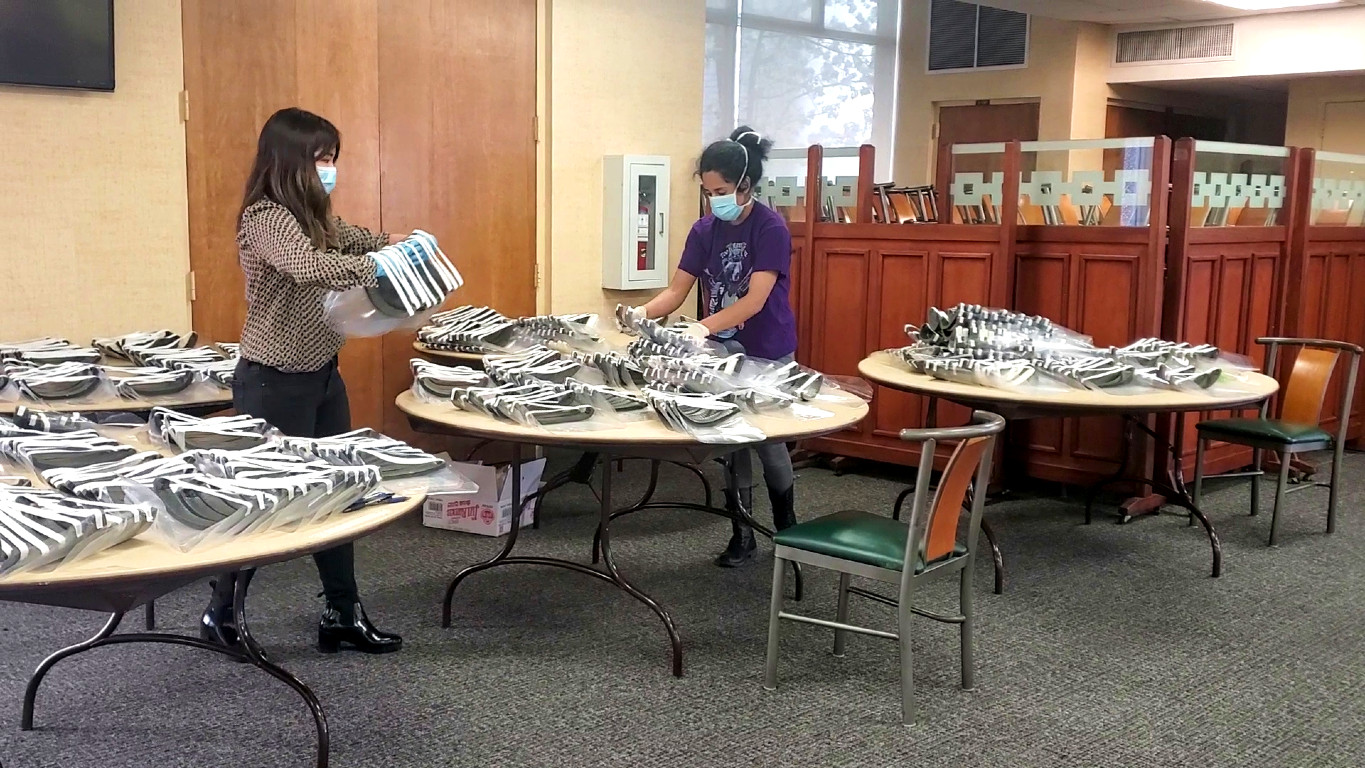
Einstein student volunteers stacking face masks they constructed
My final year at Einstein has looked very different from the fourth year I had prepared for, but it has also reinforced for me the role I can play in medicine. A little over a year ago, during a dedicated research year, I was working on a project investigating cardiac complications in children with obstructive sleep apnea. Suddenly, the COVID-19 pandemic altered the medical landscape, changing everything. I could never have guessed that in the course of this year I would be fielding calls on Montefiore’s occupational health services helpline, designing face shields from plastic sheeting, talking with patients as they considered joining clinical trials for novel therapies, serving as a volunteer acting intern on a COVID-19 ward, and scheduling vaccination appointments for frontline healthcare workers.
Organizing the Response
As the pandemic unfolded around us last March, it became clear that COVID-19 was going to significantly affect all of us in the Bronx. Like many Einstein students, I was motivated to contribute and help my community during this time. A clear area of need emerged in the occupational health services office. A new hotline had been created; employees experiencing symptoms of COVID-19 could call to get advice about staying home from work and getting tested for the virus. It was swamped. Todd Cassese, M.D., associate dean for medical education, asked me and three other Einstein students (Alyssa Yeung, Corin Kinkhabwala, and Michael Longo) to form a leadership team. We quickly coordinated student training, scheduling, and logistics for sending student volunteers to the call center.
At the center, we spoke with associates from Montefiore campuses who were involved in all aspects of the healthcare system—nurses, operations managers, residents, environmental services staff, and attending physicians. In the face of uncertainty about the disease, we shared the most up-to-date information about current protocols and testing availability. We also served as engaged listeners while our colleagues in the hospital asked questions regarding the virus and its effect on themselves, their patients, and their colleagues.
This was our first opportunity to support our frontline colleagues as they worked tirelessly caring for patients. It was also not our last.
As students began to organize more volunteer opportunities, it became clear that having a formal structure to help get new projects off the ground quickly and efficiently would deliver the greatest impact. Three other students (Bryan Szeglin, Rachel Weinstock, and Sally Park) and formed the COVID-19 Einstein Response Team, a group that worked closely with Dr. Cassese to help coordinate all pandemic-related student volunteer efforts. We sought to serve as a volunteer “project incubator,” assisting students who wished to start new volunteer opportunities by providing administrative support and centralizing organizational efforts wherever possible.
Up Close on a COVID-19 Ward
Several weeks later, as the pandemic progressed, I volunteered to work directly caring for patients with COVID-19 and joined a team at Jacobi Medical Center as a volunteer acting intern. Inside the hospital for the first time since the pandemic started, I caught a firsthand glimpse of the heartache, hope, and terror that many people—on both sides of the doctor-patient relationship—were experiencing. I worked with teams of wonderfully dedicated nurses and doctors. Some had travelled across the country to assist New York with the surge. Others came from various local departments, clinics, and hospitals to help care for patients on our hospital wards. In that tumultuous time, I felt a renewed dedication to apply my knowledge and passion to help people one-on-one.
Getting Vaccines to the Front Line
Less than a year after the beginning of the pandemic, I arrived at 6 a.m. on a Saturday in January at the Jack D. Weiler Hospital where a COVID-19 vaccination unit had recently opened. In a huge feat of scientific progress, vaccines were gaining approval and becoming available. With this new phase of the pandemic, student volunteers were working on the vaccine rollout at Montefiore. Along with Joshua Nosanchuk, M.D., senior associate dean for medical education, and fellow students Bryan Szeglin, Taneisha Sinclair, and Rachel Weinstock, I worked to implement and coordinate student volunteering at the vaccination sites. At five hospital and clinic sites around the Bronx, medical students worked alongside nursing staff to immunize healthcare workers—and later community members—against SARS-CoV-2. It was incredible to think that I was participating in the vaccination effort against a virus that I had never heard of a year ago.
At each phase of the pandemic, I saw how the healthcare system and healthcare workers responded to the many and changing demands made of them. I am in awe of everyone, from the staff and volunteers on the help line to the nurses and doctors on the hospital wards to the many leaders in public health, medicine, basic science, and translational research who allowed us to go from being unable to consistently offer testing back in March 2020 to vaccinating our colleagues and community in January 2021. The COVID-19 pandemic has left a wake of suffering, economic devastation, and uncertainty. I’m grateful to have been a part of the Einstein community, which took on a mission to assuage COVID-19’s effects and tackle its new (and many) challenges.
Reflecting on this past year, I see how my experiences have reinforced my original motivation to become a physician. I’ve worked with incredible mentors and peers who model compassion, courage, and commitment. As I look towards the next step of beginning pediatrics residency in July, I feel certain that the many lessons learned during the COVID-19 pandemic at Einstein will support me as I strive to continue putting knowledge into action.

